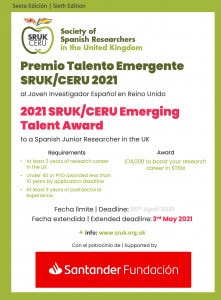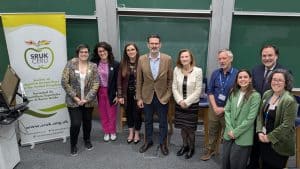- The Society of Spanish Researchers in the UK (SRUK/CERU) supports the recent announcement by the UK government regarding a review of visa routes for highly skilled workers, particularly scientists.
- The high cost of visa applications and the Immigration Health Surcharge remain significant obstacles for international researchers.
- SRUK/CERU calls for more flexible visa policies to support the attraction and retention of research talent.
London, UK. January 29, 2025. The Society of Spanish Researchers in the UK (SRUK/CERU) welcomes the recent announcement by Chancellor Rachel Reeves regarding a forthcoming review of visa routes for certain highly skilled workers, including scientists. This is a positive development for the community of Spanish and European researchers in the UK, who have long faced significant barriers in the current immigration system, as detailed in our recent report on the impact of Brexit.
Our latest SRUK/CERU 2024 Brexit Survey highlighted international mobility as a key concern among our members, with 80% of respondents identifying the new immigration policies as a significant barrier. In particular, the high cost of visa applications—including the Immigration Health Surcharge—remains a major obstacle for international researchers.
This review aligns with one of SRUK/CERU’s key advocacy priorities: a dedicated mobility agreement for researchers between the UK and the EU, as we outlined in our science policy recommendations for the 2024 UK General Election and the 2024 European Parliament Elections. We have consistently called for policies that facilitate the movement of researchers across borders, and we reiterate our recommendations for the new immigration white paper and visa review:
1. Reduce the financial barriers for international researchers. Visa costs in the UK are very high in comparison with other European countries and include upfront fees—such as the Immigration Health Surcharge—placing an undue burden on researchers. This has worsened with the latest 66% increase in this surcharge in 2024. Moreover, we consider this surcharge itself to be a discriminatory element, as international researchers contribute to the economy and public services by paying taxes like any other worker in the country.
2. Ensure an inclusive approach that extends beyond STEM disciplines. The UK’s research system benefits from contributions across all fields of knowledge. Visa policies would better reflect this by supporting researchers and academics from all disciplines, including the humanities, social sciences, and the arts.
3. Support retention of international researchers. Research positions are often temporary and highly mobile. To retain the attracted talent, we recommend introducing a flexible visa scheme for researchers, similar to the Graduate Visa route. This would allow researchers to remain in the UK after their contracts end while seeking new opportunities—critical in a job market where “right to work” status is often a prerequisite. Right now, this is only possible for scientists under a Global Talent visa, but not for those under sponsored routes.
4. Increase flexibility in visa conditions and sponsorship. Stricter financial requirements, such as the increase in the minimum salary threshold to £38,700, have made it even more challenging for researchers to obtain or renew visas. While researchers’ salaries should ideally exceed these thresholds, this is not always the case—especially as many UK higher education institutions are currently facing significant financial distress. This policy change has also led to the elimination of many hiring schemes for early-career researchers and academics, particularly in the humanities, such as language assistants and lecturers in modern languages departments. To address these challenges, it is crucial to increase the number of sponsorships that UK higher education institutions can offer, streamline sponsorship processes, improve visa access for family members, and introduce greater flexibility in financial criteria.
As the UK seeks to position itself as a global leader in research and innovation, we urge policymakers to take these issues into account to ensure a truly open research environment.
About SRUK/CERU
The Society of Spanish Researchers in the UK (SRUK/CERU) is a non-profit organization established in 2012 representing Spanish nationals working in R&D in the UK. With over 720 members, SRUK/CERU has actively monitored the challenges and opportunities associated with Brexit and their impact on Spanish researchers both in the UK and elsewhere. Through its surveys and other initiatives, SRUK/CERU aims to address the challenges posed by Brexit and advocate for the interests of its members. The Society engages with key stakeholders, including academic institutions and governmental bodies, to inform policy and drive positive change.
For more information, please contact: Dr Igor Arrieta, Head of Science Policy at [email protected].




